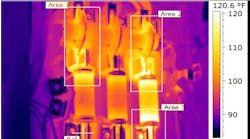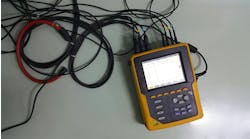Digital Technologies Drive Productivity and Safety in Electrical Construction Market
Today’s electrical contractors are challenged by doing more work with fewer resources. Digital tools and technology are leading the way to productivity gains and improved safety metrics. New types of electrification, a rise in renewables, and a demand for smart technologies are driving growth in the electrical construction market, says Mike Hoppe, ABB product marketing director for the U.S. Electrification digital portfolio. Hoppe was recently featured with Mike Dutoit, ABB product marketing manager, on a webinar hosted by EC&M.
“A lot is happening in the electrical industry,” Hoppe says. “We’re seeing unprecedented growth in various types of construction, infrastructure, and EV charging, which is fueling a lot of work for the electrical industry and electrical contractors.”
Hoppe credits three mega-trends for growth in the market — global climate change, which is driving the energy transition; a shift to smart technologies in the electrical construction industry; and the global pandemic, which caused supply chain issues and the rebirth of U.S. manufacturing in areas like silicon wafers and chips, automotive and batteries
Analyzing Trends
Electrical contractors nationwide and even globally are seeing a boost in new sources of energy, from solar and wind to nuclear and hydrogen. Everything from appliances and vehicles to machines and buildings demand electricity, and the new energy transition is looking for ways to provide the necessary power.
“Electrification is everywhere,” Hoppe says. “As more energy is required and you bring renewable energy to commercial buildings and industrial factories, our contractors are going to experience that, and certainly electricians.”
The industry is also experiencing a change in smart technologies as the electrical devices being worked on are becoming fully digital, he added.
“Electrical equipment has really moved from an analog world to full-on digitally connected devices, so something like a breaker can now be fully connected and communicate data for temperature, voltage, and current,” he says. “Now you’re seeing a shift to technology that goes beyond simple sensing to communicating data for automated switching.”
Streamlining Work in the Field
Electrical contractors are now poised to embrace the new market opportunities. With a smartphone in their pockets and a tablet or laptop in their work vehicles, electricians can use mobile apps for scheduling, billing, and invoicing.
“Today, much of the technology is easy to use, and there’s a short learning curve,” Hoppe says. “We are doing whatever we can to make it as easy as possible and reduce the time it takes to train.”
For example, workers using mobile apps can get more work done safely outside the arc flash zone and familiarize themselves with the equipment and maintenance issues. Knowing exactly what to do before they arrive on site helps eliminate guesswork, he says.
“Anything we can do to reduce the amount of time you work inside the arc flash zone prepares an electrician for the work to be performed,” Hoppe says. “This leads to a safer environment, but it also helps them to be more efficient.”
By remotely monitoring electrical equipment, contractors can understand what is happening at the equipment or device level without running the risk of having a worker on site.
“If an electrician does not have to be on site to physically diagnose an issue and can instead remotely monitor the device and know exactly what problem is occurring, that will save the workforce time,” he says. “Then they can plan based on how urgent that issue is.”
Exploring Augmented Reality
Electricians can not only remotely monitor electrical equipment, but they can also leverage the power of augmented reality (AR) to boost their productivity on the job site.
“Electricians can actually walk up to a device, scan a QR code with a camera on their phone or tablet, and pull up all relevant information like reference documents, 3D imaging, or photorealistic imaging of the device,” Hoppe says.
They can then explore the device and see inside it to pinpoint exactly which components need to be replaced or repaired — all before they open the panel and begin work.
“Augmented reality isn’t a future technology,” Hoppe says. “It’s here today and something that ABB offers as part of our solutions. We see that electricians not only have an interest in it, but they’re using it.”
Case in point: In a recent EC&M survey of the Top 50 electrical contractors, AR came up as the fourth most important technology for contractors and electricians. According to the survey results, about 25% of those contractors are using some form of AR in their daily work, and more than 40% expect to use AR or some variant of the technology within the next two years.
Through visualization in AR, electricians can view a model of the equipment, access critical information, and enhance the device they’re working on by making changes in the software. Meanwhile, virtual reality (VR) is often used in training simulations, where it’s safer than learning to work on live equipment.
“I think virtual reality is next level,” Hoppe says. “You can have the headset on and visually see the represented device, but you’re not actually affecting it.”
Looking to the future, electrical contractors need to familiarize themselves with what is out in the market and know that these things are available today, says Mike Dutoit, ABB product marketing manager.
“I think more features and functionality are going to come, so the sooner they adopt this type of technology, the better off they’ll be in the future when it becomes more and more commonplace,” Dutoit says.
As electrical contractors dive into the world of digital technologies, they can learn more by visiting the ABB Digital Solutions Center.
Sponsored by:




